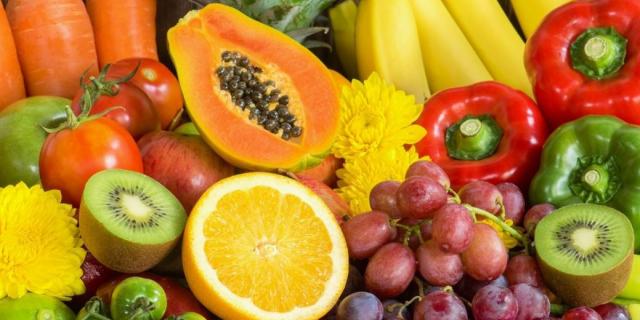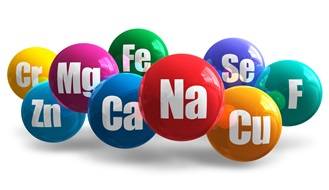https://cdn.steemitimages.com/DQmWbMua46Y92XkhMCctdZVXQsNzQ8DWHPckUc27kXvqTXq/frutas_y_verduras.jpg
[source](http://www.chihuahua.gob.mx/atach2/frutas_y_verduras.jpg)

Vitamins are low molecular weight organic compounds that the body needs for normal functioning. They are important for growth, development, regeneration, health maintenance. Vitamins diversify the vital functions of an organism. They are biological catalysts of chemical reactions that occur in the body, participate in the formation of enzymes, provide normal digestion, actively support the body's defenses and play an important role in the prevention and treatment of diseases. Vitamins affect the regulation of metabolism and, in case of deficiency, in addition to vitamin deficiency, metabolic alteration is observed. They help cleanse the body and eliminate toxins, improve the quality of skin, nails and hair, slow down the aging process, increase immunity, promote cell recovery, affect emotional, hormonal levels, increase energy and strength Physical, mental activity, affect the formation, strengthening and restoration bones. [source](https://www.practicavida.es/wp-content/uploads/2017/03/best-memory-vitamins.jpg)

Vitamin A.
It is an essential component of nutrition. It contributes to the normal functioning of the skin and mucous membranes, has a beneficial effect on protein metabolism and body growth processes. Participates in carbohydrate metabolism, increases the body's resistance to infections. Vitamin A deficiency causes vision problems, metabolism, wrinkles, dry skin, brittle hair and nails, which leads to a sharp decrease in the ability to see at nightfall (night blindness). Sources: cream, sour cream, butter, eggs, liver and in the form of provitamin A (carotene) is found in carrots, red pepper, green salad, cabbage, spinach, tomatoes, rowan fruits and rose hips.
Vitamin B1 (thiamine).
Participates in the metabolism of carbohydrates in the body, if it is missing, it is possible that nervous system disorders occur, decreased performance, it can be polyneuritis. Vitamin B1 is contained in bread and cereal products, especially cereal products, bran, unrefined products, legumes and liver.
Vitamin B2 (riboflavin).
It has a normalizing effect on the function of the organs of vision. Participates in metabolism, especially necessary for children. It contains vitamin B2 in yeast, milk, cottage cheese, eggs, cheese and liver.
Vitamin B6 (pyridoxine).
It is necessary for the normal functioning of the central nervous system. It plays an important role in improving immunity. The best source: yeast and liver. It is also found in eggs, beef, pork, potatoes, beets.
Vitamin C (ascorbic acid).
Participates in metabolic processes, it is necessary for the synthesis of collagen, the main protein of the skin, mobilizes the body's defenses against infectious diseases, has a beneficial effect on the state of blood vessels, especially in combination with vitamin P , which has a vasoconstrictive effect. Sources of vitamin C: rosehip, blackcurrant, parsley, cabbage of various types, citrus fruits, dill, strawberries, peppers, tomatoes, green onions, rowan soda.
Vitamin D.
Regulates the metabolism of calcium and phosphorus. Vitamin deficiency causes rickets. Most of vitamin D is found in fish products, butter, egg yolk, fresh herbs, fish oil. It is formed and stored in the body under the influence of sunlight.
Vitamin D3.
It contributes to total calcium absorption, inhibits calcium leaching from bone tissue. Regulates phosphorus metabolism.
Vitamin K.
A lot of it on the green leaves of lettuce, spinach, swedish, pumpkin. Promotes blood clotting during bleeding.
Vitamin PP (nicotinamide).
It is necessary for the normal functioning of the nervous system, healthy skin and mucous membranes. Content in rye bread, peas, liver, kidneys, mushrooms, honey. The absence of this vitamin leads to an inflammatory skin disease.
Minerals.
[source](https://www.vidanaturalia.com/wp-content/uploads/2013/09/Principales-Minerales-Alimentos-VidaNaturalia.jpg)

Minerals are chemical elements obtained by the body from the outside, and necessary for man for the proper functioning of all organs and systems. They regulate many physiological processes: from bone formation to blood clotting. Minerals are also important for the body, as are vitamins. Minerals provide muscle strength and bone strength, are responsible for fat burning and cell renewal, and regulate acid-base balance. Most minerals are quickly consumed by the body or excreted, so we must constantly replenish their reserves by eating foods rich in minerals. Only iron can accumulate in our body. Minerals are necessary for the formation of the skeleton (calcium, phosphorus), muscle contractions (calcium, magnesium), the regulation of water-salt metabolism (sodium, potassium), the formation of hemoglobin (iron), hydrochloric acid in the stomach (chlorine) and the normal excitability of the nervous system (magnesium) and a number of other processes.
Potassium.
Participates in the regulation of the electrical activity of organs and tissues. Even small changes in the concentration of this element in the blood can cause serious alterations in the activity of the internal organs. Compared to sodium, potassium is less common in nature, but is found in sufficient amounts. It is found in large quantities in dried fruits and berries: apricots, dried apricots, prunes, raisins, peaches, dates. A lot of potassium in potatoes, parsley, radish, cabbage, sorrel, bananas, black currants.
Calcium.
Calcium salts and phosphoric acid are the mineral base of bones. A few grams of calcium are found in various organs and tissues. Here, calcium plays the role of regulator of intracellular processes. For example, it participates in the mechanisms of transmission of a nerve impulse from one nerve cell to another, in the mechanism of muscular and cardiac contraction. It is found in fresh parsley, spinach, green cabbage, almonds, sesame seeds (most), cheeses, cottage cheese, bone sprat, legumes, nuts.
Magnesium.
It is found in large quantities in dried vegetables, legumes, parsley, apricot, dates, blackcurrants, rye bread, millet, peas, oats, barley grains, bran, nuts and marine products. Lack of it can cause loss of appetite and nausea.
The iodine.
It forms the basis of thyroid hormones, provides vital functions throughout the life of a person. It is especially important in childhood and adolescence, since it decides an important role in the formation of the musculoskeletal system, the blood-forming organs, but especially the lack of iodine affects the mental development of the child. Iodine is found in sea fish, algae, nuts, green vegetables and fruits.
The match.
It is part of the nervous tissue, bones, teeth. People of mental work more than others need phosphorus. Phosphorus is found in meat, fish, cheese, cottage cheese, eggs, liver, peas, beans, oats, buckwheat, rye bread.
Sodium.
He is involved in maintaining the acid-base balance and the volume of water, his main duty is to maintain normal blood pressure, affects muscle activity. Sodium enters the body in the form of sodium chloride, with vegetables. Its deficiency can cause weakness.
Copper.
It is of great importance for the formation of new blood cells, which lasts a lifetime. Included in the composition of enzymes, and also involved in the synthesis of hair coloring pigment, prevents peeling of the skin. Contained in tomatoes, radishes, spinach, cabbage, eggplant, bran, yeast, nuts, almonds.
Zinc.
It affects puberty, bone formation and the breakdown of adipose tissue. Zinc deficiency is rare. Sometimes a deficiency occurs with excessive consumption of flour products and can lead to serious developmental disorders: puberty inhibition, hair loss, skeletal deformation. A sufficient amount of zinc for humans is found in the liver of animals, meat, egg yolks, cheeses and peas.
Iron.
Its main mass is concentrated in the blood. Iron is an indispensable component of hemoglobin, the erythrocyte pigment that carries oxygen from the lungs to tissues. It is also part of the enzymes that provide cellular respiration (the use of oxygen by cells). Iron is rich in apples, pomegranates, meat and liver. Iron deficiency is manifested by anemia, in addition to skin peeling, nail exfoliation, appearance of cracks in the lips, brittle hair.
Fluoride.
It is only beneficial for the body in small amounts. At low concentrations, it stimulates the development and growth of teeth, bone tissue, blood cell formation and increased immunity. The lack of fluoride increases the risk of tooth decay (especially in children). In large doses, it can cause fluorosis, which is demonstrated by changes in the skeleton. The main source of fluoride is fresh vegetables, milk and drinking water.

Originally posted here: https://steemit.com/health/@nashilda17/source-of-health-vitamins-minerals-and-trace-elements



No comments:
Post a Comment